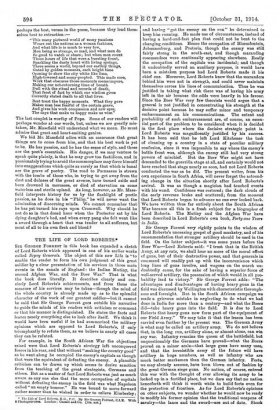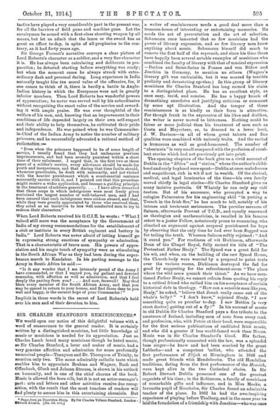THE LIFE OF LORD ROBERTS.*
Su GEORGE FORREST in this book has expanded a sketch of Lord Roberts which appeared in one of his earlier works called Sepoy Generals. The object of this new Life is "to enable the reader to form his own judgment of this great soldier by a clear presentation of his services in three main events in the annals of England : the Indian Mutiny, the second Afghan War, and the Boer War." That is what the book does literally. It describes clearly and con- cisely Lord Roberts's achievements, and from these the measure of his services may be taken—though the mind of the whole country is already made up as to the splendid character of the work of our greatest soldier—but it cannot be said that Sir George Forrest goes outside his narrative to guide the minds of his readers with criticism or comment or that his manner is distinguished. He states the facts and leaves nearly everything else to look after itself. We think it would have been useful if he had summarized the military opinions which are opposed to Lord Roberts's, if only triumphantly to refute them, as we believe in nearly all cases they can be refuted.
For example, in the South African War the objections raised were that Lord Roberta's strategy left unconquered forces in his rear, and that without "making the country good" as he went along he occupied the enemy's capitals as though that were the equivalent of defeating the enemy. A plausible criticism can be drawn up which seems to derive sanction from the teaching of the great strategists, Germans and others. But as a matter of fact Lord Roberts was just as much aware as any one else that the mere occupation of capitals without defeating the enemy in the field was what Napoleon called "an empty honour." He was bound to move forward rather sooner than be wished in order to relieve Kimberley;
• The Life of Lord Roberts, IC.O., V.C. By Sir George Forrest, C.I.E. With 8 Photogravures. Loudon: Cassell and Co. [ISs. net.] and having "got the enemy on the run" he determined to keep him running. He made use of circumstances, instead of having a bard-and-fast plan that could not be bent to the changing conditions. Hence the occupation of Bloemfontein, Johannesburg, and Pretoria, though the enemy was still fairly strong in the south-east, and though marauding commandoes were continually appearing elsewhere. Really the occupation of the capitals was incidental; and though it undoubtedly served an auxiliary purpose, it would have been a mistaken purpose had Lord Roberts made it his chief one. Moreover, Lord Roberts knew that the marauders behind him were not in strength, and could never maintain themselves across his lines of communication. Thus he was justified in taking what risk there was of having his army left in the air because the odds were heavily in his favour. Since the Boer War very few theorists would argue that a general is not justified in concentrating his strength at the decisive point because he may suffer minor and temporary embarrassment on his communications. The extent and probability of such embarrassment are, of course, an essen- tial part of the problem to be considered when it is decided in the first place where the decisive strategic point is. Lord Roberts was magnificently justified by his success. It has been said that he left Lord Kitchener the task of cleaning up a country in a state of peculiar military confusion, since it was impossible to say where the enemy's battle front was, although the enemy still had very strong powers of mischief. But the Boer War might not have descended to the guerrilla stage at all, and certainly would not have reached that stage nearly so soon, had not Lord Roberts conducted the war as he did. The present writer, from his own experience in South Africa, will never forget the astound- ing change in the situation shortly after Lord Roberts's arrival. It was as though a magician had touched events with his wand. Confidence was restored; the dark clouds of the early reverses broke and scattered; from the moment that Lord Roberts began to advance no one ever looked back. We have written thus far entirely about the South African War because all this is a fresh subject for a biographer of Lord Roberts. The Mutiny and the Afghan War have been described in Lord Roberts's own book, Forty-one Years in India.
Sir George Forrest very rightly points to the wisdom of Lord Roberts's unceasing gospel of good musketry, and of his recommendation that stronger artillery should be used in the field. On the latter subject—it was some years before the Boer War—Lord Roberts said : "I trust that in the British Army, at any rate, we shall hear no more of the moral effect of guns, but of their destructive power, and that generals in command will readily put up with the inconvenience which long lines of guns involve, and wagons on the march un- doubtedly cause, for the sake of having a superior force of well-served artillery, the possession of which would in all pro- bability lead to victory." Sir George Forrest adds : "The advantages and disadvantages of having heavy guns in the field was discussed by Wellington with characteristic thorough- ness and foresight. But in the South African campaign we made a grievous mistake in neglecting to do what we had done in India for more than a century—and what the Boers did—take heavy guns into the field. It is due to Lord Roberts that heavy guns now form part of the equipment of our Field Army." We may take it that the leason has been carried even further by the present war. The German Army is what may be called an artillery army. We do not believe that, in the long run, artillery alone, or almost alone, can win any war. Infantry remains the queen of the battlefield, but unquestionably the Germans have proved—what the Boers proved on a minor scale—that large guns have many uses, and that the irresistible army of the future will have artillery in huge numbers, as well as infantry who are much better marksmen than the German infantry. Forts, we may already assume, have been blown out of fashion by the great German siege guns. No nation, of course, entered this war with the thought of ever allowing its army to be locked up in a fortified place, but we dare say that no nation henceforth will think it worth while to build forts even for the protection of frontiers. As for Lord Roberts's opinions on other subjects, we wonder whether he would now be ready to modify his former opinion that the traditional weapons of cavalry—the lance and the sword—are out of date. Shock
tactics have played a very considerable part in the present war, for all the barriers of field guns and machine guns. Let the cavalryman be armed with a first-class shooting weapon by all means, but let us admit that the lance or the sword has as great an effect to-day, in spite of all prophecies to the con- trary, as it had forty years ago.
Sir George Forrest's narrative conveys a. clear picture of Lord Roberts's character as a soldier, and a very fine character it is. He has always been calculating and deliberate in pre- paration; he detested starting before everything was ready; but when the moment came he always struck with extra- ordinary dash and personal daring. Long experience in India naturally taught him the moral value of the offensive, for, if one comes to think of it, there is hardly a battle in Anglo- Indian history in which the Europeans were not in greatly inferior numbers. Then Lord Roberts has wonderful powers of appreciation; he never was served well by his subordinates without recognizing the exact value of the service and reward- ing it with ample praise. He was ever thoughtful of the welfare of his men, and, knowing that an improvement in their conditions of life depended largely on their own self-respect and their ability to help themselves, he cultivated their pride and independence. He was pained when he was Commander- in-Chief of the Indian Army to notice the number of military prisoners, and he successfully advocated a rational method of reclamation :- "Even when the prisoners happened to be of some length of service, I usually found that they had undergone previous imprisonments, and had been severely punished within a short time of their enlistment. I urged that, in the first two or three years of a soldier's service, every allowance should be made for youth and inexperience, and that during that time faults should, whenever practicable, be dealt with summarily, and not visited with the heavier punishment which a court-martial sentence necessarily carries with it, and I pointed out that this procedure might receive a wider application, and become a guiding principle in the treatment of soldiers generally. . . . I have often remarked that those corps in which indulgences were most freely given contained the largest number of well-behaved men, and I had been assured that such indulgences were seldom abused, and that, while they were greatly appreciated by those who received them, they acted as an incentive to less well conducted men to try to redeem their characters."
When Lord Roberts received his G.C.I.E. he wrote : "What I valued still more was the acceptance by the Government of India of my strong recommendations for the establishment of a club or institute in every British regiment and battery in India." Lord Roberts was never afraid of letting himself go in expressing strong emotions of sympathy or admiration. That is a characteristic of brave men. His powers of appre- ciation and his magic touch of sympathy were as stimulating in the South African War as they had been during the super- human march to Kandahar. In his parting message to the Army in South Africa he said :—
"Is it any wonder that I am intensely proud of the Army I have commanded, or that I regard you, my gallant and devoted comrades, with affection as well as admiration, and that I feel deeply the parting from you P . . . And now, farewell! May G-od bless every member of the South African Army, and that you may be spared to return to your homes, and find those dear to you well and happy, is the earnest hope of your Commander ! "
Implicit in those words is the secret of Lord Roberts's hold over his men and of their devotion to him.



































 Previous page
Previous page